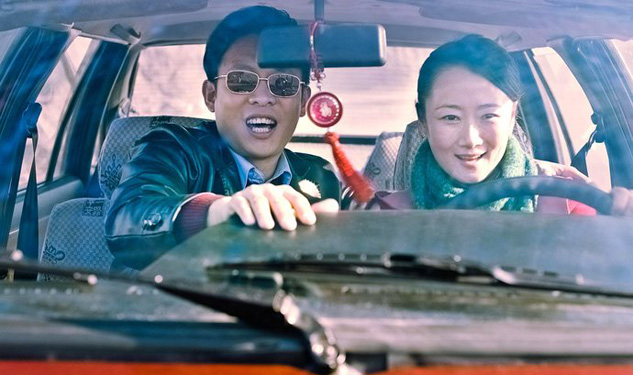
- Industry
Cannes Review: Mountains May Depart (Shan He Gu Ren)
JIA Zhang-Ke is a Cannes festival veteran. He was here last in 2013 winning the screenwriting award with A Touch of Sin, a fascinating narrative woven through the river landscapes and provincial back roads of his native China. That film was a parable of sorts, a snapshot of a society in the midst of momentous and dramatic change on a never before seen scale. Several stories crisscrossed on the backdrop of extraordinary economic development with all its repercussions on the social fabric and human relations. Characters moved as in a daze in a world they hardly seemed to recognize, full of sweatshop factories, newfangled capitalists, brothels, violent crime and above all the alienation that comes from radical transformation in a very short time.
His follow up effort Mountains May Depart (Shian He Gu Ren), is practically a companion piece and a sequel of sorts, further investigating the contours of the amazing pace of change and development in Earth’s most populous nation and its effects on its people – and beyond. Jia begins his story in 1999 as a mid-size provincial city is preparing to give the new millennium and enthusiastic New Year’s welcome (to the tune of the Pet Shop Boys’ Go West). 20 year-old Tao rings in the New Year with a concert performance attended by her two suitors, Liangzhi and Zhang. The latter is one of the towns’ budding visionary capitalists, showing off his shiny new VW sedan and buying the run-down local coal mine. He eventually wins Tao and marries her. So enthusiastic a believer is he in the promise of his (and China’s) future, that when their son is born he names him Dollar.
For his part the defeated Lianghzi leaves for another province and a hard life of mining, only to return years later a broken man with lung cancer, a bride and a newborn baby. It is now 2014 and in the meantime Jujitsu has divorced Tao and moved to Shanghai where he has become a truly successful oligarch, winning custody of Dollar and taking a new wife. The boy is attending an elite International school in the city and when he visits his mother back in Fenyang (also the director’s hometown) for his grandfather’s funeral, he insists, to her great chagrin, in speaking English, calling her “mummy” and discussing luxury goods with his stepmother on Skype. In the intervening fifteen years the landscape has radically changed and is now crisscrossed by bullet trains, giant plants have replaced the old factories and modern roads are crowded with German luxury cars. It all underscores a sense of loss, of place and identity, for Tao, whose loss of her father and alienation from her son, are amplified by a country she no longer recognizes. If it wasn’t bad enough Dollar’s dad is about to move with his family to Australia. The third act of Mountains May Depart takes place ten years hence, in 2025, when we find Dollar as a restless youth in a fashionable Gold Coast community, not particularly interested in the Chinese language and culture he and his fellow second-generation classmates take at the local college. The kids all speak English. One of them chides Dollar about how they should have named him after some other currency given the horrific decline of the eponymous greenback. It’s not a farfetched scenario nor is the one of a massive Diaspora of well to do Chinese (in Cannes a Chinese film market publication wrote about a recent rush to buy Seattle real estate sparked by the success of a Chinese remake of Sleepless in Seattle).
Dollar chafes at his father’s attempt to rein him in, professes to have no interest in college and takes a job in a restaurant. Something haunts him about his middle-aged Chinese teacher. They become lovers but it’s apparent that the source of his affection is transference of the longing he feels for a mother he barely remembers, and with her for a lost homeland. The allegory might seem too obvious in someone else’s hands but Jia infuses the story with a haunting feeling that is never maudlin or rhetorical. As in A Touch of Sin this is not social realism or heavy-handed metaphor, rather what you term an eerie poetics of displacement, reflected in Jia’s signature style in which different characters and their storylines enter – and exit – the narrative. In other words, Jia has composed another thoughtful allegory that goes to the heart of one of this time’s great social and economic trends through his very human characters.